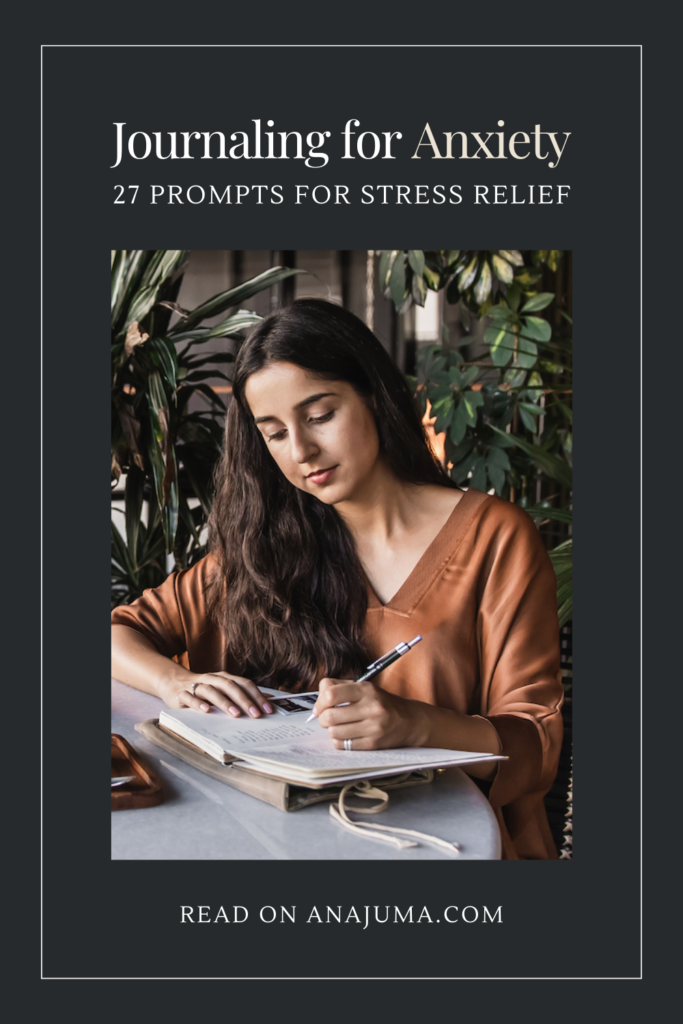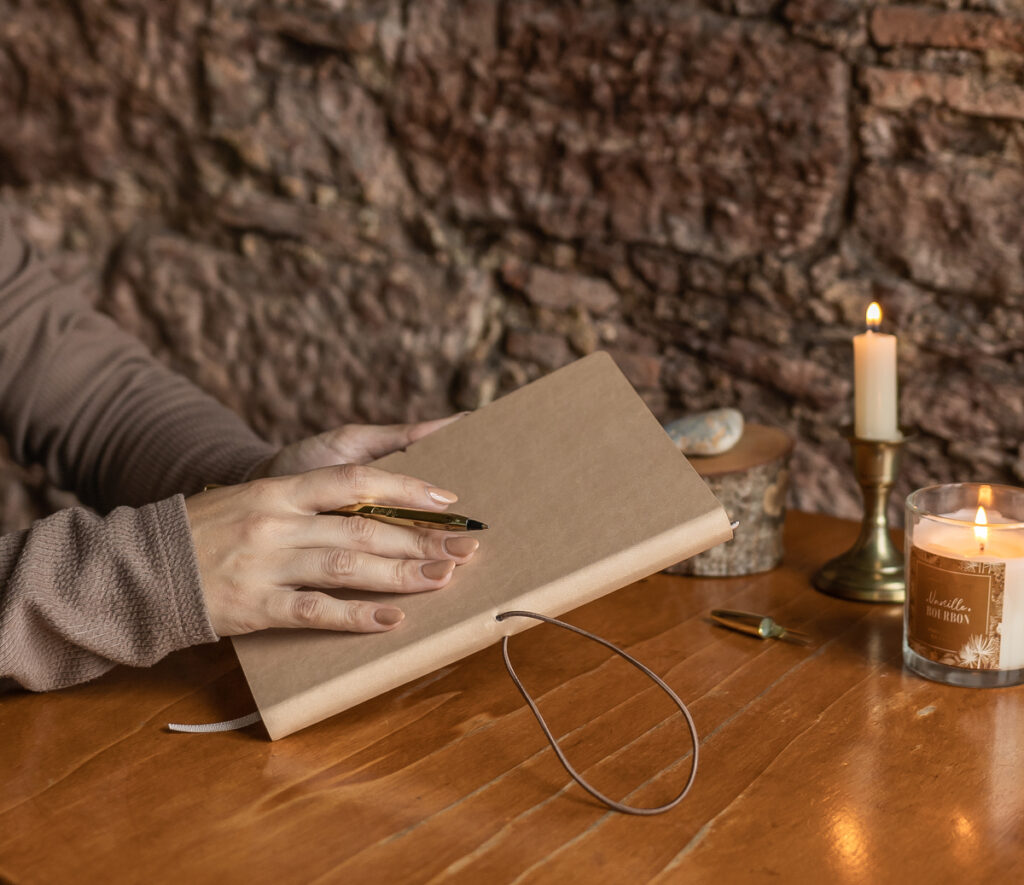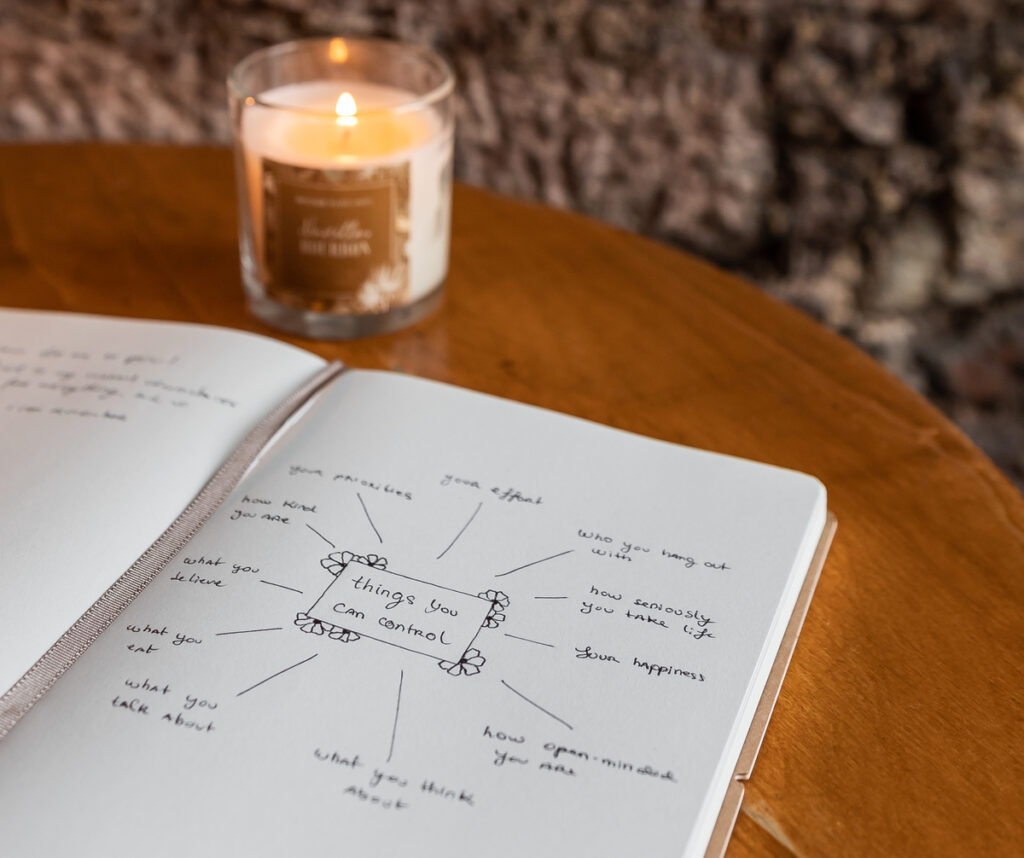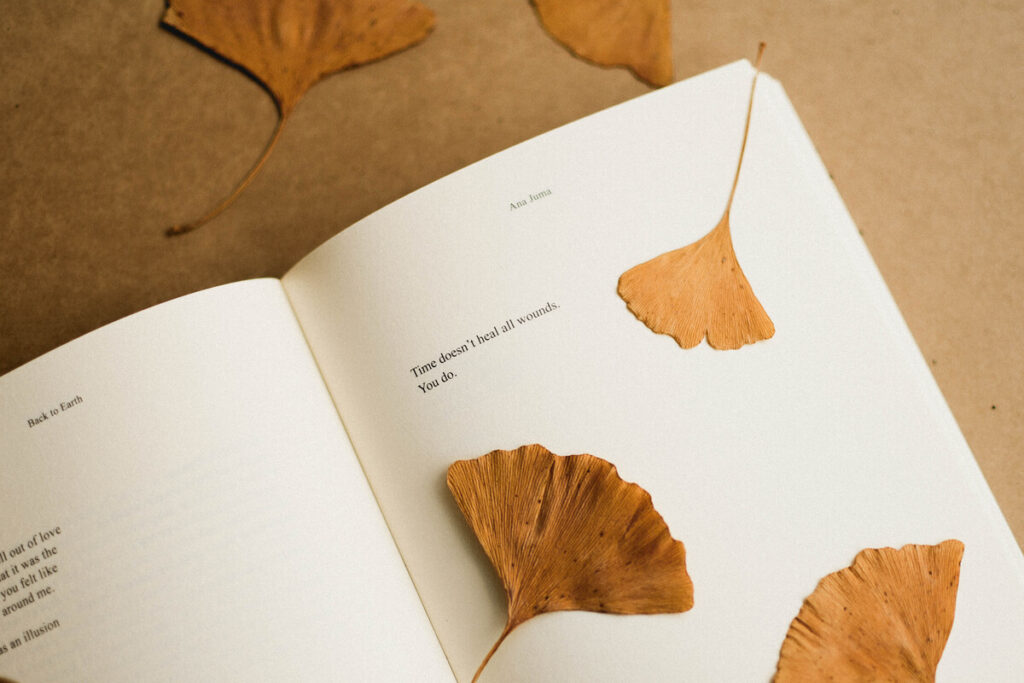
Journaling for Anxiety: 27 Prompts for Stress Relief

About Ana Juma
Keeping a diary from a young age has encouraged me to explore writing as a vehicle of self-discovery and expression. Today, I support individuals nourishing and healing their inner lives through words, so we can find meaning in experiences and co-create a kinder world.
Table of Contents
Pin for later!

Let's Connect

If you’re thinking about starting a practice of journaling for anxiety, chances are that you’ve felt its grip tightening your mind and heart. It’s a familiar feeling for many of us — that relentless chatter of worry, the racing heartbeat, the knot in the stomach.
I know that sometimes finding those moments of tranquility seems like an elusive dream. However, the solution may lie within your reach, in something as simple as putting pen to paper. When those moments of apprehension come around, it’s so important to know you have the right tools in your pocket to manage more intense emotional waves.
For this reason, we will explore together:
- How Journaling Helps With Anxiety
- What Does Science Say?
- How to Start a Journaling Practice for Anxiety
- 27 Journaling Prompts for Anxiety
And as the famous Dutch activist, writer, and speaker, Corrie ten Boom, once said:
“Worrying is carrying tomorrow’s load with today’s strength — carrying two days at once. It is moving into tomorrow ahead of time. Worrying doesn’t empty tomorrow of its sorrow, it empties today of its strength.”
We may all start using journaling as a way to strengthen our today, while gently preparing for the challenge of tomorrow.
How Journaling Helps With Anxiety
In the pages of a journal, we may find a refuge for our restless thoughts, but also a pathway towards self-exploration. Here are a few benefits of journaling for anxiety:
1. Emotional release
Journaling provides a safe outlet to express and release pent-up emotions, reducing the intensity of anxiety. Sometimes your journal may act as your most trusted confidant, the best friend you can vent to, or even your emergency therapist, listening patiently to your reflections.
2. Increased self-awareness
Through journaling, you get the chance to become more attuned to your thoughts, feelings, and triggers, which can lead to insights into your anxiety patterns. Being able to recognize them takes you one step further to better manage your stress responses and triggering factors.
3. Stress reduction
When you write about your thoughts and feelings in a journal, you effectively express and externalize your emotions. Through that emotional release, your body tunes into a sense of calm and relaxation, which can physically lower levels of stress hormones.
4. Problem-solving
Sometimes anxiety can darken our perspectives and capacity to come up with solutions. For this reason, writing down your thoughts might free your mind of unwanted chatter, nurturing more clarity and insight into a difficult situation.
5. Healthy coping mechanism
It’s no surprise that journaling could serve as a constructive coping strategy for dealing with anxiety. Oftentimes, anxiety catches us in a void of endless thoughts and emotions, which might be more difficult to navigate when we don’t have healthy mechanisms to alleviate our struggle.
6. Tracking progress
Keeping a journal allows you to track your progress over time while recognizing patterns, identifying triggers, and celebrating victories. Having a wider perspective on your accomplishments may cultivate a deeper sense of self-trust, as anxiety diminishes because you recognize how competent you’ve been in navigating life’s ups and downs. This too shall pass.
7. Mindfulness practice
You might’ve heard before that anxiety disconnects you from the present moment, leaving you lost in the uncertainty of the future or dwelling in the regrets of the past. Journaling encourages mindfulness by focusing attention on the present moment, fostering a sense of grounding and detachment from anxious thoughts.
8. Self-compassion
Through journaling, you can cultivate self-compassion by offering yourself kindness and understanding in the face of anxiety, rather than harsh self-judgment. Writing down about your anxiety creates a safe space to practice gentleness towards your own vulnerabilities or moments of struggle.
9. Empowerment
When reflecting on triggers of anxiety through journaling, you take more control over the narrative that your mind creates. This may empower you to feel more in charge of your life, reducing feelings of helplessness and uncertainty associated with anxiety.
10. Improved communication
Journaling can enhance your communication skills by helping you articulate your thoughts and feelings more effectively. In consequence, your interpersonal relationships and support networks could strengthen, as you get to experience a better understanding of how to express your needs when dealing with moments of anxiety.

What Does Science Say?
First of all, Dr. Caroline Leaf, communication pathologist and research neuroscientist, underlines an important aspect of dealing with day-to-day anxiety that we sometimes tend to forget:
“Experiencing feelings of anxiety and sadness doesn’t mean you have a mental illness, that there is something wrong with your brain, or that something is broken inside of you. Rather, it means you are having a perfectly normal, even helpful, response to an adverse situation.”
Journaling might bring you a sense of peace and comfort, acting as an adjuvant as you untangle the overwhelmingly emotional state of anxiety. And science agrees, too.
Studies and research
Cognitive behavioral therapy (CBT), a widely respected and evidence-based approach to treating anxiety disorders, often incorporates journaling techniques to challenge and reframe negative thought patterns.
By recording and examining their thoughts in a structured manner, individuals can identify cognitive distortions and develop more balanced and rational perspectives, which leads to a better recovery from stress and anxiety.
Moreover, a 2018 study suggests that the Positive Affect Journaling method, that is, writing about positive aspects of yourself and life, can decrease symptoms of depression and improve overall well-being in participants with a registered level of mild to moderate anxiety. Findings have shown improvements in patients’ emotional state after 1 month of introducing this simple cost-effective method, and have continued to transform over the 12 weeks of research.
Another relevant research on the topic of journaling is the positive impact of expressive writing (a method of writing therapy developed by psychologist James Pennebaker in the late 1980s). For instance, one study showed that students dealing with anxiety performed better on math tests after being asked to write about their thoughts and feelings using this therapeutic journaling method.
The overall conclusion of the existing research is that indeed, journaling represents a low-cost, low-side-effect adjunctive therapy that aids in the process of improving mental health, depending on the overall associated symptoms of the patient.
For this reason, many professional counselors and psychotherapists recommend the practice of journaling, when interacting with anxiety-related thoughts, feelings, and emotional experiences permeating the daily life of an individual.

How to Start a Journaling Practice for Anxiety
Introducing a new habit in your routine can seem a little daunting in the beginning, especially if you don’t know where to start. Here are a few steps you can take to help you prepare for this journey of self-discovery:
1. Choose the right supplies for you
If you get excited about new purchases and like the process of doing so, you can first invest in a high-quality notebook or journal that feels inviting to write in.
Perhaps, you may opt for one with aesthetically pleasing covers or smooth luxurious paper. This isn’t a mandatory requirement, as the traditional pen and paper work just fine, although it may enhance your overall journaling experience.
2. Create the environment
Peace and calm indeed come from the inside out. However, an environment conducive to introspection may help you connect easily to the peace within.
Begin by setting aside a designated space in your home where you feel calm and comfortable, free from distractions. Consider adding elements that engage the senses and evoke a sense of tranquility, such as soft lighting, soothing music, or the gentle flicker of a candle.
3. Prepare physically and mentally
Before you begin, take a few deep breaths to center yourself and cultivate a mindset of openness and curiosity. The focus isn’t on relaxing entirely, as sometimes we may deal with intense emotional moments.
However, taking a few minutes to close your eyes and breathe gently, while making sure you’re hydrated and feel comfortable in your clothes might help you connect deeper to the present moment.
4. Set a timer
Setting a timer can be a helpful technique when starting a journaling practice for anxiety. If you’re struggling with feelings of overwhelm and indecision, you can allocate a specific amount of time for journaling, such as 10 or 15 minutes.
Alternatively, listening to a music playlist on YouTube within a particular time frame can serve the same purpose.
You can start small and adjust as time goes by and you’re feeling more comfortable. The timer serves as a gentle reminder to stay present and focused on the task at hand, which can help establish consistency in your journaling routine.
5. Begin with prompts
Journaling for anxiety should never feel like a creative writing contest where you’re not sure what to write to get the grand prize. It’s a moment of gentleness towards yourself, as you let go of some pressure off your chest.
An effective way to nurture this gentleness is having prompts to start with. The idea of guidance can liberate thoughts and feelings of perfectionism, as you arrive in the moment of journaling just as you are, nothing else needed or expected from you.

27 Journaling Prompts for Anxiety
As mentioned, if the idea of freewriting feels daunting, prompts can provide a helpful starting point. Whether you decide to use a prompt occasionally or every time you journal, it offers a tangible direction for your writing.
Moreover, revisiting the same prompt over time can yield intriguing insights into the evolution of your thoughts. You may create your own list of prompts that spark your interest and curiosity. Here’s a little guidance and inspiration whenever you need a place to start:
1. Meet your anxiety
Sometimes anxiety feels like a big, scary monster ready to take over our minds. However, if we take a brief moment to encounter it, we may be surprised to find within only an innocent part of ourselves that needs gentleness and compassion.
You may take a deep breath and imagine you’re meeting this part of yourself within the pages of your journal. You may ask him/her:
- What do you think would happen if you stopped worrying?
- What makes you show up in my life this way?
- Are you trying to protect me from anything?
- What would make you feel better right now?
- Can I do anything for you?
These journaling prompts for anxiety are inspired by and often used in the Internal Family Systems Therapy Method (IFS), created by Dr. Richard Schwartz. They offer a gentle and compassionate approach to accepting and integrating the struggling parts of ourselves, instead of trying to push them away.
2. Recognize your needs
Anxiety can show up in your life as an emergency signal that your needs aren’t met and fulfilled. We grow older and more anxiety starts creeping in as our lives expand, our dreams get more challenging, and our relationships become more complex.
However, it lies within our responsibility to recognize our needs and offer ourselves the best that we can in different stages of life. You may ask yourself:
- What do I need right now?
- Do I respect my needs?
- Which core/values do I want to protect in my life?
- How are my boundaries being crossed?
- What’s a small simple action I can take to protect my boundaries in a moment of difficulty?
- Do I tend to give more than I receive?
The more space we make within to prioritize ourselves, the deeper the sense of safety will go. When we reconnect to ourselves in this way, our self-trust and confidence increase, while the experience of anxiety may slowly fade away.
3. Reorganize your thoughts
Cognitive-behavioral therapy (CBT) offers a simple method to reorganize our thoughts and replace them with more functional ones. For example, you can start by choosing one thought pattern that you notice yourself lost in whenever you feel anxious. Ask yourself:
- What event triggers my thoughts?
- What are my thoughts/beliefs after this event?
- How does my behavior change based on this belief?
- Is this thought rational, reality-based, 100% true?
- What other thought could I replace this belief with that would be helpful, functional, and reality-based?
You may use this journaling exercise every day for a certain period of time (give yourself at least one month to reap the benefits!) and see how you’re slowly but surely learning to shift your focus to more encouraging thoughts.
4. Focus on the present
As you may have heard and noticed before, anxiety disconnects you further from the present moment. It may throw you back into regrets of the past or make you worry over the uncertainty of the future.
To bring yourself back here and now, you can take a few notes on:
- What is making me anxious today?
- What do I really need right now?
- If I could, what would I let go of in this moment?
- What am I grateful for today?
- Is there any supportive action/word I can give myself today?
- How did I win today?
There’s never a right or wrong answer, and sometimes it’s truly difficult to reconnect to the present. However, taking a moment to get into the habit of doing so may calm down your system and fill your heart with the small joys of your everyday life.
5. Nurture hope for the future
Thinking about the future isn’t detrimental to your mental health, especially when you teach yourself to be hopeful and focused on the things that truly matter to you. Here are a few examples:
- What would I do in the following month if I knew I couldn’t fail?
- What would my wiser best self from the future advise me to do?
- Is there a small habit I would like to introduce into my life in the next 3-6 months?
- What small promise can I make to myself for the following week?
- If I could do anything in the next year, what would it be?
Planning ahead, knowing what to focus on, and deciding on small steps we can take will help us feel safer and more peaceful. Additionally, it might cut down on the uncertainty that often scares us regarding our future life.
Write Away
As you start writing, remind yourself to see the process of journaling for anxiety as a tender yet transformative practice. It’s an invitation to dive deeper into the complexity of your mind, while offering solace and insight.
Journaling may be another opportunity to create resilience and serenity within yourself. As time goes by, you can celebrate your victories by watching your transformation unfold through the pages of your journal. What excites you the most? 🙂
And whenever you feel like you need a bit more guidance, just know that I have prepared a 7-day beginner’s guide to journaling for you to explore. All you have to do is leave your email below and gently step on this path of coming back to yourself.
7-Day Free Journaling Journey
Keeping a journal for personal growth is one of the most powerful, yet simple (and affordable) rituals you can cultivate. Join me to receive daily emails for a week to help you start writing a journal today.

Hello, I'm Juma
Keeping a diary from a young age has encouraged me to explore writing as a vehicle of self-discovery and expression. Today, I support individuals nourishing and healing their inner lives through words, so we can find meaning in experiences and co-create a kinder world.
Pin for later!

